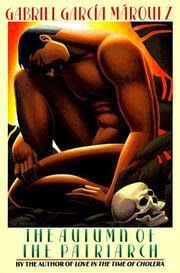El otoño del patriarca
Gabriel García Márquez is probably my favourite author and I have read quite a number of his books. I'm lucky to be able to read them in Spanish, but I happened to pick up The Autumn of the Patriarch in English at a book sale. It's probably just as well because it is a terribly challenging read. I'm tempted to say I might not have actually been able to get through it in Spanish. In fact, The Autumn of the Patriarch frequently pops up on lists of most challenging books to read, up there with Naked Lunch and Finnegans Wake.
With sentences that go on for chapters, jump across time periods, and shift from first to third person, The Autumn of the Patriarch paints a vivid portrait of the rambling, failing mind of a dictator caught in the madness of his own dictatorship. The narrative challenges, while not ideal beach holiday reading, are perfect for describing the General's long, nightmarish reign and the surreal experience of totalitarianism. It's a book I would like to reread (in Spanish?) when I have the time for proper contemplative reflection.


